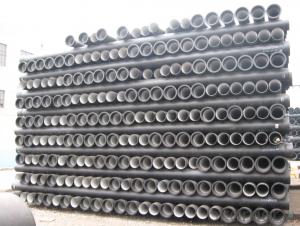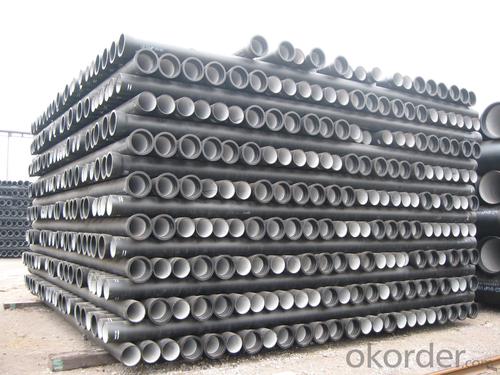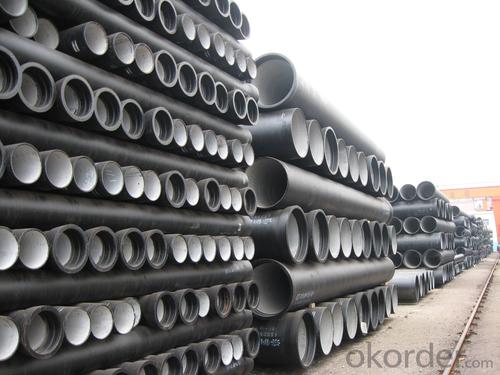Ductile Iron Pipe DN450
OKorder Service Pledge
Quality Product, Order Online Tracking, Timely Delivery
OKorder Financial Service
Credit Rating, Credit Services, Credit Purchasing
You Might Also Like
Specifications
Quick Details
| Place of Origin: | China (Mainland) | Brand Name: | CMAX | Model Number: | T type / K type / Flange type |
| Length: | 6m / 5.7m / Negotiable | Standard: | ISO2531 / EN545 / EN598 | Application: | Potable / Sewage water |
| Diameter: | DN80~DN2200 | Shape: | Round | Hardness: | 230 |
| Pipe Wall Thickness: | standard | Pull Strength: | 420 | Yield (≥ MPa): | 300 |
| Material: | Ductile Iron | Type: | Centrifugal ductile cast iron pipe | Certification: | ISO2531 / EN545 / EN598 |
| Outer Diameter: | 80-2200 | Thickness: | standard | Specification: | DN80~DN2200 |
| |
The advantages to the customer:
Trustworthy financial strength.
One-stop shopping.
Fast and efficient service.
Coordination of shipments from multiple plants.
Specialists of the overseas shipping process.
A more competitive price.
- Q: What is the expected thermal expansion coefficient of ductile iron pipes?
- The expected thermal expansion coefficient of ductile iron pipes typically ranges from 10.8 to 12.2 x 10^-6 per degree Celsius.
- Q: Fire water supply network adopts ductile iron pipe, the test pressure should be no more than MPa
- To your selected fire pump highest lift 1.5 times to suppress, generally not more than 1.6MPa, if the use of ductile iron pipe, test pressure according to 2MPa to suppress.
- Q: Can ductile iron pipe be used for bridge crossings?
- Ductile iron pipe is suitable for bridge crossings due to its strength, durability, and flexibility. Its high tensile strength enables it to bear heavy loads and vibrations, making it ideal for supporting bridges and withstanding traffic weight. Moreover, the pipe's flexibility allows it to absorb movements and deformations caused by temperature changes, settling, and other factors, minimizing the risk of structural damage and ensuring the bridge crossing's longevity. Additionally, the pipe's resistance to corrosion makes it a dependable choice for bridge crossings exposed to moisture, chemicals, and other corrosive elements. Overall, ductile iron pipe possesses properties that make it a reliable and appropriate material for bridge crossings.
- Q: The difference between cast iron pipe and ductile iron pipe
- Ductile iron is based on the cast iron to change some of the characteristics of the structure of iron, so that it has become a lot of toughness, than the cast iron pipe is too brittle shortcomings much better, the tensile strength of the pipe bending strength greatly improved. The sealing material used in the socket interface is rubber ring.
- Q: What are the different pressure ratings available for ductile iron pipe?
- Ductile iron pipe is commonly used in various applications due to its strength, durability, and resistance to corrosion. The pressure ratings for ductile iron pipe depend on various factors such as the diameter and wall thickness of the pipe. Generally, ductile iron pipe is available in pressure ratings ranging from 150 psi (pounds per square inch) to 350 psi. For smaller diameter pipes, typically ranging from 3 inches to 24 inches, the pressure ratings commonly found are 150 psi, 200 psi, and 250 psi. These pressure ratings are suitable for a wide range of applications such as water distribution systems, sewer lines, and industrial piping. For larger diameter pipes, typically ranging from 30 inches to 64 inches, the pressure ratings available are usually 150 psi, 200 psi, 250 psi, and 350 psi. These higher pressure ratings are often required for transporting larger volumes of water or other fluids over longer distances. It is important to note that the pressure ratings for ductile iron pipe are determined based on industry standards and guidelines. These standards ensure that the pipe can safely handle the internal pressure and external loads it may encounter during operation. When selecting the appropriate pressure rating for ductile iron pipe, it is crucial to consider factors such as the specific application, flow rates, and the expected operating conditions. Consulting with industry professionals and adhering to local codes and regulations is essential to ensure the proper selection and installation of ductile iron pipe for a specific project.
- Q: How does ductile iron pipe perform in areas with high groundwater contamination?
- Ductile iron pipe is known for its durability and resistance to corrosion, making it a suitable choice for areas with high groundwater contamination. The pipe's protective lining and coating prevent the groundwater from coming into direct contact with the iron, thereby minimizing the risk of corrosion and deterioration. Additionally, ductile iron pipe has the ability to withstand external pressures, making it less susceptible to damage caused by shifting soils or groundwater movement. This characteristic is especially beneficial in areas with high groundwater contamination, as the pipe can maintain its structural integrity and prevent leaks or bursts. Furthermore, ductile iron pipe has a long service life, which reduces the need for frequent replacements and minimizes the potential for groundwater contamination caused by pipe failures. Overall, ductile iron pipe performs exceptionally well in areas with high groundwater contamination, providing a reliable and durable solution for transporting water or wastewater while ensuring the protection of the surrounding environment.
- Q: How do ductile iron pipes handle concentrated loads?
- Ductile iron pipes are highly resistant to concentrated loads due to their inherent strength and flexibility. They have the ability to distribute the load over a larger area, minimizing the risk of failure or damage. This makes them suitable for handling heavy loads and ensuring long-term durability in various applications.
- Q: Advantages and disadvantages of ductile iron pipes
- Comparison between ductile iron pipe and universal cast iron pipe: the process of making ductile iron pipe is cast by adding alkaline earth metal or rare metal such as magnesium and calcium in the raw material of common cast iron pipe. The casting process of nodular cast iron pipe casting method and water cooled centrifugal casting hot continuous casting method, which method is water, the world's most advanced technology, different technology of ductile cast iron and cast iron pipe technology performance comparison, not only to maintain the ordinary cast iron pipe corrosion resistance, and has the advantages of high strength and toughness good, thin wall, light weight, impact resistance, bending performance, convenient installation.
- Q: Are there any limitations to the length of ductile iron pipe sections?
- Yes, there are limitations to the length of ductile iron pipe sections. The length of ductile iron pipe sections is typically limited due to practical considerations such as transportation, installation, and handling. Longer pipe sections can be more difficult to transport and maneuver, especially in areas with limited access or challenging terrain. Additionally, longer pipe sections may be more prone to damage during installation, as they can be more difficult to align and join properly. There are also limitations in terms of manufacturing capabilities. Ductile iron pipes are typically manufactured in standard lengths, which can vary depending on the manufacturer and the specific application. These standard lengths are typically designed to balance the needs of transportation, installation, and the overall performance of the pipe. Furthermore, longer pipe sections may pose challenges in terms of expansion and contraction due to temperature variations. Ductile iron pipes are susceptible to thermal expansion and contraction, and longer sections may experience greater stress and strain as a result. Therefore, while there is no absolute limit to the length of ductile iron pipe sections, practical considerations and manufacturing capabilities often result in the use of standard lengths that balance various factors such as transportation, installation, and performance.
- Q: Can ductile iron pipes be used for irrigation systems in agricultural fields?
- Ductile iron pipes are indeed suitable for use in agricultural fields for irrigation systems. Their durability, strength, and corrosion resistance are well-known, making them an excellent choice for a variety of applications, including irrigation systems. These pipes can withstand high pressures and effectively transport water for irrigation purposes. Moreover, the ductile iron material is resistant to various environmental factors like UV rays, soil chemicals, and temperature changes, ensuring that the pipes have a long lifespan. Additionally, ductile iron pipes exhibit excellent flow characteristics, enabling efficient water distribution across the agricultural fields. In summary, ductile iron pipes offer a reliable and sturdy option for irrigation systems in agricultural fields, delivering a sustainable and efficient solution for water distribution.
Send your message to us
Ductile Iron Pipe DN450
OKorder Service Pledge
Quality Product, Order Online Tracking, Timely Delivery
OKorder Financial Service
Credit Rating, Credit Services, Credit Purchasing
Similar products
Hot products
Hot Searches
Related keywords

























